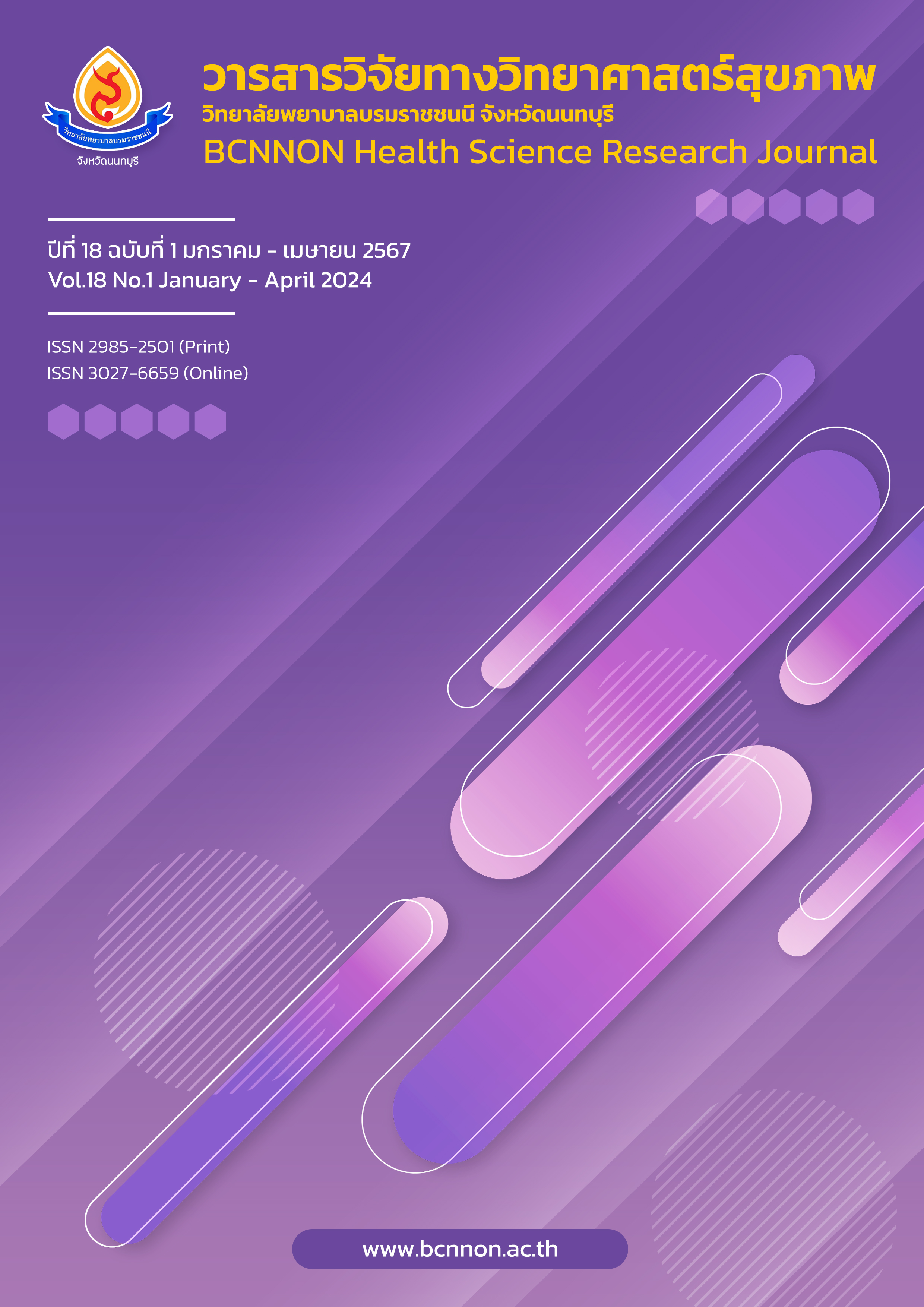ปัจจัยที่มีอิทธิพลต่อความวิตกกังวลหลังคลอดของมารดาหลังคลอด ในเมืองเหวินโจว ประเทศจีน
Main Article Content
บทคัดย่อ
บทนำ : ความวิตกกังวลหลังคลอดเป็นภาวะที่พบมาก อาจจะไม่รุนแรงเมื่อเปรียบเทียบกับอาการป่วยทางจิตอื่น ๆ แต่อาการดังกล่าวอาจพัฒนาไปสู่ความเจ็บป่วยทางจิตที่ร้ายแรงได้
วัตถุประสงค์การวิจัย : เพื่อศึกษาความวิตกกังวลหลังคลอดและปัจจัยที่มีอิทธิพลต่อความวิตกกังวลหลังคลอดในหญิงหลังคลอด เมืองเหวินโจว ประเทศจีน
วิธีการวิจัย : การวิจัยสหสัมพันธ์เชิงทำนาย ตัวอย่าง คือ หญิงหลังคลอด จำนวน 148 คน คัดเลือกแบบสุ่มอย่างง่าย เครื่องมือที่ใช้ในการวิจัย ประกอบ 1) แบบสอบถามข้อมูลทั่วไป 2) แบบสอบถามความรอบรู้ด้านสุขภาพจิต 3) แบบสอบถามการสนับสนุนทางสังคม และ 4) แบบสอบถามความวิตกกังวล วิเคราะห์ข้อมูลโดยใช้สถิติเชิงพรรณนา และการถดถอยพหุคูณเชิงเส้นตรง
ผลการวิจัย : ตัวอย่างมีความวิตกกังวลหลังคลอดในระดับต่ำ (M=25.45, SD=5.59) การไม่ได้เลี้ยงลูกด้วยนมแม่ ความรอบรู้ด้านสุขภาพจิต และการสนับสนุนทางสังคมสามารถอธิบายความแปรปรวนของความวิตกกังวลหลังคลอดได้ร้อยละ 30.8% (β=0.011, p=.022, β=-0.463, p<.001; β=-0.16, p=.023 ตามลำดับ) ความวิตกกังวลหลังคลอดมีผลกระทบอย่างมีนัยสำคัญในตัวอย่างที่ไม่เลี้ยงลูกด้วยนมแม่เมื่อเปรียบเทียบกับที่ให้นมแม่เพียงอย่างเดียว (β=0.188, p=.022) การเลี้ยงลูกด้วยนมแม่อย่างเดียวและการเลี้ยงลูกด้วยการผสมระหว่างนมแม่และนมผงไม่แตกต่างกัน (β=-0.028, p=.722) อายุไม่สามารถทำนายความวิตกกังวลหลังคลอดได้ (β=-0.008, p>.05)
สรุปผล : พยาบาลควรช่วยเหลือหญิงหลังคลอดให้ได้รับความรู้ด้านสุขภาพจิต และสนับสนุนให้เลี้ยงบุตรด้วยนมแม่ต่อไป สมาชิกในครอบครัวและสังคมควรสนับสนุนและดูแลหญิงหลังคลอดอย่างเพียงพอ เพื่อป้องกันไม่ให้เกิดความวิตกกังวลหลังคลอด
Downloads
Article Details

อนุญาตภายใต้เงื่อนไข Creative Commons Attribution-NonCommercial-NoDerivatives 4.0 International License.
บทความที่ได้รับการตีพิมพ์เป็นลิขสิทธิ์ของวิทยาลัยพยาบาลบรมราชชนนี จังหวัดนนทบุรี
ข้อความที่ปรากฏในบทความแต่ละเรื่องในวารสารวิชาการเล่มนี้เป็นความคิดเห็นส่วนตัวของผู้เขียนแต่ละท่านไม่เกี่ยวข้องกับวิทยาลัยพยาบาลบรมราชชนนี จังหวัดนนทบุรี และคณาจารย์ท่านอื่น ในวิทยาลัยฯ แต่อย่างใด ความรับผิดชอบองค์ประกอบทั้งหมดของบทความแต่ละเรื่องเป็นของผู้เขียนแต่ละท่าน หากมีความผิดพลาดใด ๆ ผู้เขียนแต่ละท่านจะรับผิดชอบบทความของตนเองแต่ผู้เดียว
เอกสารอ้างอิง
Dennis CL, Brown HK, Falah-Hassani K, Marini FC, Vigod SN. Identifying women at risk for sustained postpartum anxiety. J Affect Disord. 2017;213:131-7. doi: 10.1016/ j.jad.2017.02.013.
Field T. Postnatal anxiety prevalence, predictors and effects on development: a narrative review. Infant Behav Dev. 2018; 51:24-32. doi: 10.1016/j.infbeh.2018.02.005.
Liu Y, Guo N, Li T, Zhuang W, Jiang H. Prevalence and associated factors of postpartum anxiety and depression symptoms among women in Shanghai, China. J Affect Disord. 2020;274:848-56. doi: 10.1016/j.jad.2020.05.028.
Lefkovics E, Rigo J Jr, Kovacs I, Talaber J, Szita B, Kecskemeti A, et al. Effect of maternal depression and anxiety on mother's perception of child and the protective role of social support. J Reprod Infant Psychol. 2018;36(4):434-48. doi: 10.1080/02646838. 2018.1475726.
Osnes RS, Eberhard-Gran M, Follestad T, Kallestad H, Morken G, Roaldset JO. Mid-pregnancy insomnia is associated with concurrent and postpartum maternal anxiety and obsessive-compulsive symptoms: a prospective cohort study. J Affect Disord. 2020;266:319-26. doi: 10.1016/j.jad.2020.01.140.
Fallon V, Bennett KM, Harrold JA. Prenatal anxiety and infant feeding outcomes: a systematic review. J Hum Lact. 2016; 32(1):53-66. doi: 10.1177/0890334415604129.
Chen M, Cao S, Wang L, Wu Z. Application of multi-mode analgesia in the treatment of aged femoral intertrochanteric fracture under the enhanced recovery after surgery. Chinese Journal of Geriatric Orthopaedics and Rehabilitation. 2019;5(1):4-8.
Tandon SD, Ward EA, Hamil JL, Jimenez C, Carter M. Perinatal depression prevention through home visitation: a cluster randomized trial of mothers and babies 1-on-1. J Behav Med. 2018;41(5):641-52. doi: 10.1007/s10865-018-9934-7.
Dagher RK, McGovern PM, Dowd BE. Maternity leave duration and postpartum mental and physical health: implications for leave policies. J Health Polit Policy Law. 2014;39(2):369-416. doi: 10.1215/ 03616878- 2416247.
Racine N, Plamondon A, Hentges R, Tough S, Madigan S. Dynamic and bidirectional associations between maternal stress, anxiety, and social support: the critical role of partner and family support. J Affect Disord. 2019;252:19-24. doi: 10.1016/j.jad.2019.03.083.
Ystrom E. Breastfeeding cessation and symptoms of anxiety and depression:a longitudinal cohort study. BMC pregnancy and childbirth. 2012;12(1):1-6. doi: 10.1186/1471-2393-12-36.
Peitz D, Kersjes C, Thom J, Hoelling H, Mauz E. Indicators for public mental health: a scoping review. Front Public Health. 2021;27(9):714497. doi: 10.3389/fpubh.2021.714497.
Waddell C, Shepherd CA, Chen A, Boyle MH. Creating comprehensive children's mental health indicators for British Columbia. Can J Commun Ment Health. 2013;32(1):9-27. doi: 10.7870/cjcmh-2013-003.
Ming Z, Chen Z, Wang Y, Jiang L, Guo F. Reliability and validity of multicomponent mental health literacy measure-Chinese version in male military personnel. Chinese Academy of Sciences. 2021;37(1):86-91. doi: 10.11847/ zgggws1123418.
Zheng J, Huang Z, Huang J, Zhuang X, Wang D, Zherng S, et al. A study on the psychometric characteristics, norm score and factor structure of beck anxiety scale. Chinese Journal of Clinical Psychology. 2002;10(1):4-6.
Chen Y, Huang J, Au H, Chen YH. High risk of depression, anxiety, and poor quality of life among experienced fathers, but not mothers: a prospective longitudinal study. J Affect Disord. 2019;242:39-47. doi: 10.1016/ j.jad.2018.08.042.
Suchan V, Peynenburg V, Thiessen D, Nugent M, Dear B, Titov N, et al. Transdiagnostic internet-delivered cognitive behavioral therapy for symptoms of postpartum anxiety and depression: feasibility randomized controlled trial. JMIR Form Res. 2022;6(9):e37216. doi: 10.2196/37216.
Fallon V, Halford JCG, Bennett KM, Harrold JA. Postpartum-specific anxiety as a predictor of infant-feeding outcomes and perceptions of infant-feeding behaviours: new evidence for childbearing specific measures of mood. Arch Womens Ment Health. 2018;21(2):181-91. doi: 10.1007/s00737-017-0775-0.
Lee HY, Hwang J, Ball JG, Lee J, Yu Y, Albright DL. Mental health literacy affects mental health attitude: is there a gender difference?. Am J Health Behav. 2020; 44(3):282-91. doi: 10.5993/AJHB.44.3.1.
Arnold M, Kalibatseva Z. Are “Superwomen” without social support at risk for postpartum depression and anxiety?. Women Health. 2021;61(2):148-59. doi: 10.1080/03630242. 2020.1844360.
Shao S, Yan S, Zhu P, Hao J, Zhu B, Tao F. Persistent pregnancy-related anxiety reduces breastfeeding exclusiveness and duration: a prospective cohort study. Breastfeed Med. 2022;17(7):577-83. doi: 10.1089/bfm.2021.0346.


